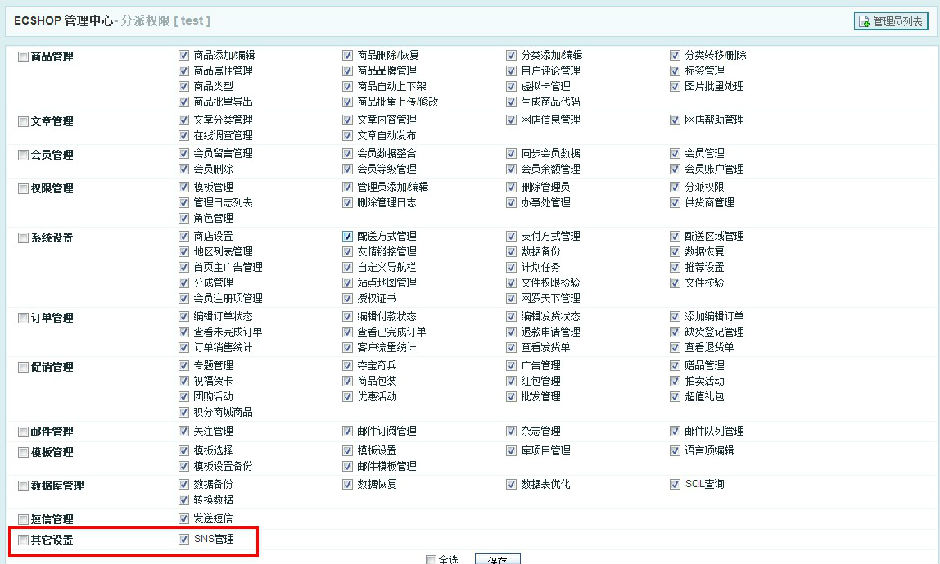ECSHOP模版系统显示标签使用介绍
时间:2017-04-08index.php:
require('Smarty.class.php');$smarty = new Smarty;$smarty->assign('cust_options', array(1001 => 'Joe Schmoe',1002 => 'Jack Smith',1003 => 'Jane Johnson',1004 => 'Charlie Brown'));$smarty->assign('customer_id', 1001);$smarty->display('index.tpl');
index.tpl:
<select name=customer_id>{html_options options=$cust_options selected=$customer_id}</select>
输出:
<select name=customer_id><option value="1000">Joe Schmoe</option><option value="1001" selected="selected">Jack Smith</option><option value="1002">Jane Johnson</option><option value="1003">Charlie Brown</option></select>
html_select_date
| 属性 | 类型 | 是否必须 | 缺省值 | 描述 |
| prefix | string | No | Date_ | 变量名称前缀 |
| time | timestamp/YYYY-MMDD | No | UNIX时间戳或年-月-日 | 使用时间类型(data/time) |
| start_year | string | No | 年份或与当前年份的相对值 | 下拉列表中第一个年份,或与当前年份的相对值(正/负几年) |
| end_year | string | No | 同start_year | 下拉列表中最后一个年份,或与当前年份的相对值(正/负几年) |
| display_days | boolean | No | true | 是否显示天 |
| display_months | boolean | No | true | 是否显示月 |
| display_years | boolean | No | true | 是否显示年 |
| month_format | string | No | %B | 月份的表示方法(strftime) |
| day_format | string | No | %02d | 天显示的格式(sprintf) |
| day_value_format | string | No | %d | 天的表示方法(sprintf) |
| year_as_text | boolean | No | false | 是否以文本方式显示年份 |
| reverse_years | boolean | No | false | 逆序显示年份 |
| field_array | string | No | null | 如果指定了名称,选定的区域将以[Day],[Year],[Month]的形式返回给PHP(待考) |
| day_size | string | No | null | 如果给定,为标签添加大小属性 |
| month_size | string | No | null | 如果给定,为标签添加大小属性 |
| year_size | string | No | null | 如果给定,为标签添加大小属性 |
| all_extra | string | No | null | 如果给定,为所有标签添加附加属性 |
| day_extra | string | No | null | 如果给定,为标签添加附加属性 |
| month_extra | string | No | null | 如果给定,为标签添加附加属性 |
| year_extra | string | No | null | 如果给定,为标签添加附加属性 |
| field_order | string | No | MDY | 显示区域的顺序 |
| field_separator | string | No | \n | 各区域间输出的分隔字符串 |
| month_value_format | string | No | %m | 月份值的strftime表示方法,默认为%m |
描述:
自定义函数 html_select_date 用于创建日期下拉菜单. 它可以显示任意年月日.
例子:
{html_select_date}
相关文章
 ecshop添加菜单及权限分配问题ECShop是一款B2C独立网店系统,适合企业及个人快速构建个性化网上商店。这篇文章主要介绍了ecshop添加菜单及权限分
ecshop添加菜单及权限分配问题ECShop是一款B2C独立网店系统,适合企业及个人快速构建个性化网上商店。这篇文章主要介绍了ecshop添加菜单及权限分 Ecshop 后台添加新功能栏目及管理权限设置教程这篇文章主要介绍了Ecshop 后台添加新功能栏目及管理权限设置教程,需要的朋友可以参考下
Ecshop 后台添加新功能栏目及管理权限设置教程这篇文章主要介绍了Ecshop 后台添加新功能栏目及管理权限设置教程,需要的朋友可以参考下 Ecshop实现支付时传送商品订单号和商品名称的方法这篇文章主要介绍了Ecshop实现支付时传送商品订单号和商品名称的方法,涉及Ecshop模板操作及底层代码的修改相关技巧
Ecshop实现支付时传送商品订单号和商品名称的方法这篇文章主要介绍了Ecshop实现支付时传送商品订单号和商品名称的方法,涉及Ecshop模板操作及底层代码的修改相关技巧 ECSHOP 2.7 版本去除底部版权的方法ECSHOP2.7版本的底部版权对于优化与安全都不是很好,所以好多朋友都想给删除了,下面的具体的方法,都是加密过的
ECSHOP 2.7 版本去除底部版权的方法ECSHOP2.7版本的底部版权对于优化与安全都不是很好,所以好多朋友都想给删除了,下面的具体的方法,都是加密过的 Ecshop 去除版权的设置技巧首先声明个人观点:不建议大家去除别人的版权,请尊重知识产权,特别是这样好的系统。
Ecshop 去除版权的设置技巧首先声明个人观点:不建议大家去除别人的版权,请尊重知识产权,特别是这样好的系统。 ecshop安装遇到安装数据失败的解决方法在我第一次安装ecshop时失败了。提示遇到安装数据失败。并报出警告。
ecshop安装遇到安装数据失败的解决方法在我第一次安装ecshop时失败了。提示遇到安装数据失败。并报出警告。
 织梦dedecms后台增加logo上传功能用过dedecms的朋友都知道,织梦cms后台系统基本参数里是无法直接上传图片的,我们更换logo图只能到ftp里替换,非常的不方便
织梦dedecms后台增加logo上传功能用过dedecms的朋友都知道,织梦cms后台系统基本参数里是无法直接上传图片的,我们更换logo图只能到ftp里替换,非常的不方便 PHP中递归的实现实例详解递归(http:/en.wikipedia.org/wiki/Recursive)是一种函数调用自身(直接或间接)的一种机制,这种强大的思想可以把某些复杂的概
PHP中递归的实现实例详解递归(http:/en.wikipedia.org/wiki/Recursive)是一种函数调用自身(直接或间接)的一种机制,这种强大的思想可以把某些复杂的概